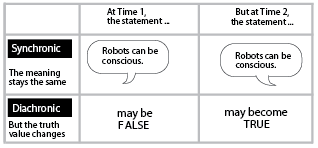Hilary Putnam (1962).

Synchronic linguistics: the study of language at a given time.
Diachronic linguistics: the study of language through time.
The truth value of statements (e.g., "Robots can be conscious" or "Pain is identical with stimulation of C-fibers") can be effected by a change of use over the course of time, without a change of meaning in the terms involved. Statements that are now false under synchronic linguistics (the study of language at a given time) may become false, as revealed by diachronic linguistics (the study of language through time).
The Putnam argumentPutnam argues as follows:
"(1) Pain is identical with stimulation of C-Fibers....There is nothing wrong with trying to bring linguistic theory to bear on this issue, but one must have a sufficiently sophisticated linguistic theory to bring to bear. The real question is not a question in synchronic linguistics but one in diachronic linguistics, not 'Is (1) now a deviant sentence ?' but 'If a change in scientific knowledge (e.g. the development of an integrated network of psychophysical laws of high "priority" in our overall scientific world view) were to lead to (1)'s becoming a non-deviant sentence, would a change in the meaning of a word necessarily have taken place?'--and this is not so simple a question" (H. Putnam, 1960, p. 377).
References
Putnam, Hilary. 1975. Minds and Machines.
Mind, Language, and Reality: Philosophical Papers, vol. 2. Cambridge: Cambridge University Press. pp. 362-386. Originally in (1960)
Dimensions of Mind, edited by Sidney Hook. New York: New York University Press.